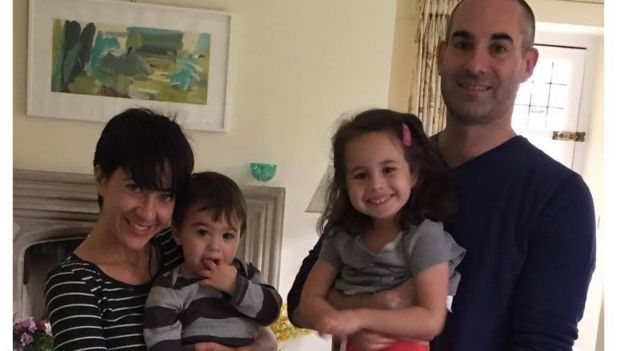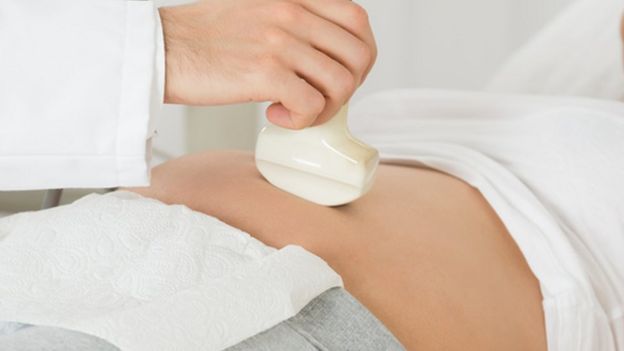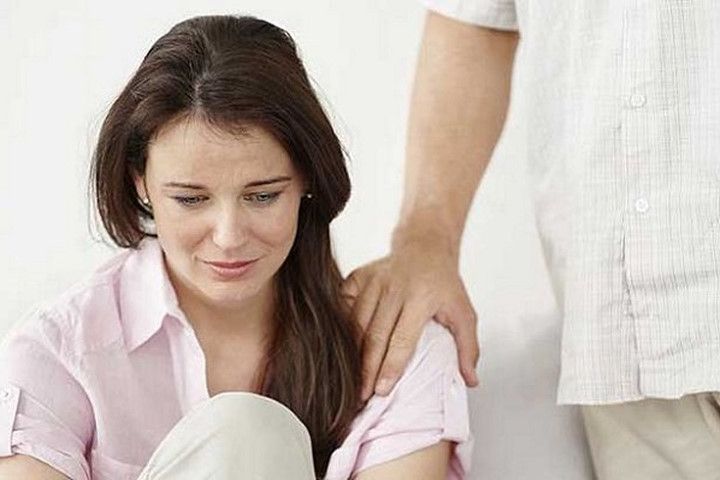 Image copyrightNICOLE MARTIN
Image copyrightNICOLE MARTINWomen who have recently had a miscarriage are at risk of developing post-traumatic stress disorder, doctors at Imperial College London have said.
At their early pregnancy loss clinic, a third of the women have PTSD symptoms.
Nicole Martin had three miscarriages in a year, her “dark days”.
“Everyone thinks because you’ve already got a child it’s easier. In a lot of respects it definitely is easier than not having a child, but I wanted another child for [my child’s] sake.”
Nicole and her husband, Ben, started trying for their second child just after their first, Eva, had turned one.
“I was 38 years old and fully aware of the risks associated with having children a bit later in life,” she says.
“It took me longer than expected to fall pregnant, and when I did I felt very anxious because many of my friends had suffered at least one miscarriage.”
 Image copyrightNICOLE MARTIN
Image copyrightNICOLE MARTINShe was carrying twins, but both died – one at five weeks and the other seven weeks into the pregnancy.
Nicole had to have an operation under general anaesthetic to treat the miscarriage.
Although shell-shocked by the experience, Ben and Nicole continued to try for a baby.
Two months later, Nicole was pregnant, but had another miscarriage at seven weeks.
“The scan showed there was no heartbeat,” she says.
“We had to have medical management this time.
“You get given a tablet which breaks down the lining of your womb and you just get sent home to miscarry.
“It’s really not pleasant.
“It’s your baby, and you have to flush it down the loo.
“It’s horrendous.”

Pregnancy loss and PTSD
Post-traumatic stress disorder can develop after a very stressful, frightening or distressing event, or a prolonged traumatic experience.
As many as one in four pregnancies is thought to end in a miscarriage – loss of a pregnancy during the first 23 weeks.
An ectopic pregnancy is when a fertilised egg implants itself outside of the womb, usually in one of the fallopian tubes.
It is not possible to save the pregnancy. It usually has to be removed using medicine or an operation.

Her subsequent third miscarriage a few months later left her a nervous wreck.
“I was a mess,” she says.
“Everywhere I went mothers were asking me, ‘When are you going to have another child?’
“I never ask a woman now about whether she’s having babies, or having a second baby, because you never know their story.”
Nicole says she nearly gave up all hope.
 Image copyright THINKSTOCK
Image copyright THINKSTOCK“I found it just unbelievably cruel,” she says.
“I remember phoning my consultant who was great.
“I said, ‘Just tell me what I should do.’
“I really wanted someone from the medical profession to say, ‘Just give up.'”
Instead, the consultant told Nicole to keep trying if she had the emotional strength because there was still a good chance she would be able to have a healthy baby.
Two months later – just after Nicole’s 40th birthday – she was pregnant with her son, Joseph, who is now nearly two years old.
“I still worry a lot, and I’m having cognitive behavioural therapy to help me cope with that,” she says.
“Even though we have two beautiful children, I still feel anxious to this day because I can’t quite believe it’s all over.
“I feel that something’s going to spoil our lovely family unit because it was such a struggle getting there.”
Dr Jessica Farren, who carried out the BMJ Open study on nearly 90 women attending the pregnancy clinic at Imperial College London for a suspected miscarriage or ectopic pregnancy, says although only a minority might have full-blown PTSD, many will suffer from moderate-to-severe anxiety.
“It’s the tip of the iceberg really,” he says.
“There will be a huge number of women who would still benefit from some support. But the NHS isn’t geared up for it.
“Once we’ve looked after these women clinically and discharged them, there’s no real opportunity to check how they are coping emotionally.”
After a healthy pregnancy, all women get screened for depression at their six-week check. But following a miscarriage, there are no routine emotional checks.
Dr Farren and her colleagues are studying more women at their clinic to see if they can better spot those that will need the most support.
In the meantime, they say help is out there if you know where to look.
“There are some really good charities and organisations that can offer counselling, and your GP is a good place to start if you want some help accessing support,” says Dr Farren.
Source: http://www.bbc.com/news/health-37833287







